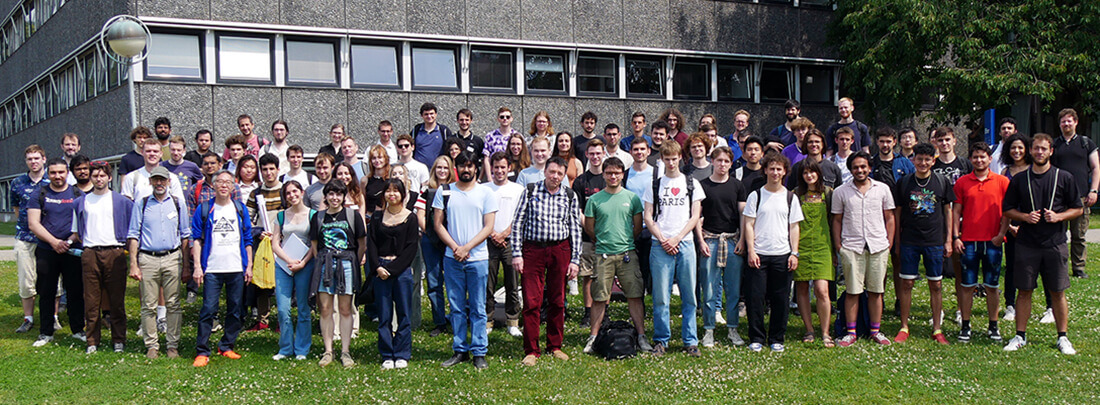4EU+ course: Quantum Information and Quantum Many-Body Theory

QMATH organizes a 4EU+ course on Quantum Information and Quantum Many-Body Theory together with the University of Milan, the University of Warsaw, the University of Geneva, Heidelberg University, Sorbonne University and Charles University.
The course is open to Danish and international PhD students and master students within MATH, Physics and Computer Science. Expected minimal requirements: Linear algebra some elementary quantum knowledge, e.g., elementary quantum computing or elementary quantum mechanics.
Masterclass in Copenhagen
The course will be finished with a masterclass/summer school to be held physically in Copenhagen (24-28 June 2024).
Although course participants will take precedence, we open the school also to other interested Master and PhD students.
In particular the school will be a DigiQ network event and therefore, DigiQ students will have the possibility to apply for travel support at their home institution.
A number of international experts will give presentation about latest developments in Quantum Many-body theory and Quantum information.
List of speakers:
- Jonatan Bohr Brask, Technical University of Denmark
- Géraldine Haack, Université de Genève, Switzerland
- Cécilia Lancien, Institut Fourier Grenoble, France
- David Perez-Garcia, Universidad Complutense de Madrid, Spain
- Hal Tasaki, Gakushuin University, Japan
- Amanda Young, University of Illinois Urbana-Champaig, USA
Cécilia Lancien and David Perez Garcia are joint speakers with the masterclass Operator Algebras, Random Matrices, and Quantum Expander Graphs
Their titles and abstracts can be found there under course content.
Summer School Schedule
|
|
Mon |
Tues |
Wed |
Thur |
Fri |
|
9:15-10 |
Registration and Coffee |
Lancien |
Tasaki |
Young |
|
|
10-10:30 |
Welcome at 10:20 |
Coffee |
Coffee |
Coffee |
Coffee |
|
10:30-12:15 |
Haack |
Tasaki |
Tasaki |
Lancien |
Perez-Garcia |
|
12:15-14:00 |
Lunch |
Lunch |
Lunch |
Lunch 12:15-13:45 |
Lunch |
|
14-15:45 |
Lancien |
Brask |
OUTING |
Perez Garcia 13:45-15:30 |
Young |
|
15:45-16:15 |
Coffee |
Coffee |
Coffee 15:30-15:45 |
Coffee and goodbye |
|
|
16:15-18 |
Haack |
Brask |
Young 15:45-16:45 |
|
|
|
18- |
Reception |
Pizza-Poster |
Dinner from 17:30-19:00 sharp!. Food Club, Sortedam Dosseringen 7C. |
|
Title and Abstracts
Tasaki:
Title: Topological index and phase transition in S=1 quantum spin chains
Abstract: I will first give an introductory seminar-style presentation to motivate the study of the Haldane phase and “topological” phase transitions in S=1 spin chains. Then, in the main lectures, I will discuss (1) the AKLT model, which is a prototypical spin chain with a unique gapped ground state, (2) the notion of a locally-unique gapped ground state of spin systems on the infinite chain, and (3) an elementary index theory for U(1) invariant models and its applications to topological phase transitions. I will finish the lectures with another seminar-style presentation discussing the general theory of symmetry-protected topological (SPT) phases and Ogata's index theorem in spin chains.
Young:
Title: On the existence and stability of a spectral gap for quantum spin models
Abstract: A fundamental quantity in the classification of quantum phases of matter is whether or not a physical system has a spectral gap above the ground state energy. While the importance of the spectral gap is well known, it is a notoriously difficult to rigorously determine a nonvanishing gap and for frustration-free quantum lattice models, there are only two classes of general methods for proving spectral gaps: methods based on localizing excitations via ground state projections, and finite size criteria. Once a model is known to be gapped, one then wishes to determine if it is characteristic of a gapped ground state phase, which can be answered positively by proving that the gap is stable under small perturbations of the interaction.
In these lectures, we discuss the notion of a gapped ground state phase of matter and review general methods for proving the existence and stability of the spectral gap for frustration-free quantum spin systems. In both cases, properties of the ground states are key for proving these results. To illustrate how to use these techniques, applications to AKLT models will be discussed.
Brask:
Title: Quantum information security and device independence
Abstract: Quantum physics enables information security based on fundamental laws of nature via quantum random-number generation (QRNG) and quantum key distribution (QKD). Furthermore, by exploiting Bell nonlocality, the security of QRNG and QKD protocols can be established even from black-box devices that are almost completely untrusted, providing an ultimate level of security known as device independent (DI). In these lectures, we will introduce device-dependent QRNG and QKD and the basics of device-independent protocols.
Haack:
Title: Quantum information in Open Quantum Systems
Abstract: Uncontrolled dissipation is typically considered as detrimental for generating and manipulating quantum information resources. In this short lecture, I will introduce some basic concepts and tools to assess the dynamics of open quantum systems (master equations, Lindbladians, non-equilibrium steady states). This will allow me to discuss the possibility to generate and sustain entanglement in a bipartite quantum system thanks to dissipation with several environments biased in temperature or voltage, creating an out-of-equilibrium situation.
Course Schedule
Phase 1: March 7-May 2, 2024 Online lectures (approximately one two hour lectures every other week, in total 7 lectures)
Phase 2: May2-May 31, 2024: Students work on assignments which will be presented at a poster session at the physical meeting.


